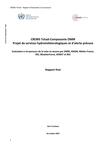Page Header

Downloads:
2
VFDM project: Integrating Flood and Drought Management and Early Warning for the Climate Change Adaptation in the Volta Basin
Overview
In line with AFB Policy, AFB-funded projects are monitored and evaluated regularly by the implementing agency. The Mid-Term Evaluation (MTE) of the VFDM project should determine the state of progress toward the achievement of outcomes and aims to identify course correction and mitigate imminent risks. MTE focus is on the effectiveness, efficiency, sustainability and timeliness of project implementation, project management team performance and to highlight issues requiring decisions and actions to align with the overall goal of the VFDM project (needs and priorities are considered and worked upon) as well as the Adaptation Fund. MTE evaluation findings are incorporated as recommendations for enhanced implementation during the 2nd half of the project’s term. The principles of design and execution of the MTE, the MTE approach, data collection methods, and limitations to the MTE, are based on project progress analysis through the following four criteria: Project relevance and design; Effectiveness analysis; Budgetary efficiency; and Sustainability The methodology applied in the present MTE is based on two types of evaluation: i) quantitative evaluation and ii) qualitative/subjective evaluation. The MTE follows the vertically layered structure of the project by addressing actors at the regional, the national and the community level. This is performed through field visits, discussion with relevant stakeholders and/or remote interviews across all levels.Report Details
| Year Published | |
| Type | |
| Joint | No |
| Partner/s | N/A |
| SDG/s | |
| Consultant name | |
| Agency Focal Point | Alok OJHA |
| Focal Point Email | ioo@wmo.int |
| Managed by Independent Evaluation Office | No |
| Geographic Scope | Regional |
| Country/ies |
YOU 'RE READING
VFDM project: Integrating Flood and Drought Management and Early Warning for the Climate Change Adaptation in the Volta Basin










